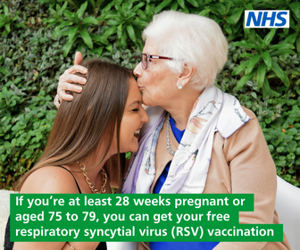Respiratory syncytial virus (RSV) vaccination

Respiratory syncytial virus (RSV) is a major cause of respiratory illness, particularly dangerous for infants and the elderly. The virus is common over the winter period, typically November to February, and can lead to pneumonia and bronchiolitis (a chest infection that affects babies).
These illnesses can cause serious breathing problems. They may need to be treated in hospital and can be life-threatening. Getting RSV can also make symptoms worse if you have a lung condition, such as chronic obstructive pulmonary disorder (COPD).
The RSV vaccine helps reduce the risk of serious breathing problems, such as pneumonia and bronchiolitis and is now available in pharmacies across Cheshire and Merseyside.
Who should have the RSV vaccine
The RSV vaccine is recommended if:
- you’re pregnant – the vaccine is recommended during every pregnancy (from 28 weeks onwards) to help protect your baby after they're born
- you’re aged 75 to 79
- If you’re aged 80 or over - If you turned 80 after 1 September 2024, you're eligible for the RSV vaccine until 31 August 2025.
- You’re not eligible for the RSV vaccine if you turned 80 on or before 1 September 2024.
How to get the RSV vaccine
If you are pregnant you should be offered the RSV vaccine around the time of your 28-week antenatal appointment. Speak to your maternity service or GP practice.
If you’re aged 75 to 79 contact your GP surgery to book your RSV vaccination.
Get vaccinated at a pharmacy
The NHS in Cheshire and Merseyside is now offering the RSV vaccine at selected local pharmacies.
You can book an appointment to get the RSV vaccination at a pharmacy below ,using the online booking system on the NHS website, or search for a pharmacy where you can get vaccinated without an appointment. Please check that your local pharmacy is offering walk-ins before turning up.
If you don’t live in the areas below, or if your nearest pharmacy offering the RSV vaccine is too far away, please contact your GP practice to arrange an appointment.
You can find out more about the RSV vaccine at www.nhs.uk/vaccinations/rsv-vaccine.